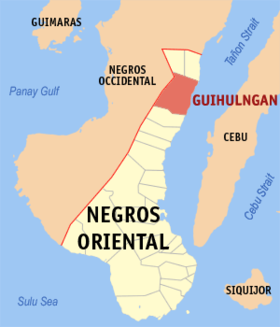Guihulngan
Appearance
| Guihulngan | |
|---|---|
| Siyudad | |
 Lokasyon na Guihulngan | |
 | |
| 10°7′12″N 123°16′12″E | |
| Dalin | Filipinas |
| Barangay | 33 |
| Kaawang | |
| • Katiponan | 388.56 km2 (150.02 sq mi) |
| Elebasyon | 194 m (636 ft) |
| Bilang na too (Mayo 1, 2020)[1] | |
| • Katiponan | 102,656 |
| • Densidad | 260/km2 (680/sq mi) |
| Economia | |
| • Clase | kumalima ya klase a siyudad |
| • Ingresos | ₱766,606,055.57 (2020) |
| • Activos | ₱2,387,750,863.83 (2020) |
| • Pasivos | ₱328,498,473.98 (2020) |
| • Gastos | ₱692,172,716.97 (2020) |
| Kodigo na postal | 6214 |
| Kodigo na lugar | 34 |
| Website |
www |
Say Guihulngan et kumalima ya klase a siyudad ed luyag na Negros Oriental, Filipinas. Unong ed 1 Mayo 2020 census, say populasyon to et 102,656 totoo tan 24,792 abong. Walay kabaleg tan sukat to ya 388.56 sq. km. Say zip code to et 6214.
Saray barangay
[dumaen | dumaen so pinanlapuan]- Bakid
- Balogo
- Banwaque
- Basak
- Binobohan
- Buenavista
- Bulado
- Calamba
- Calupa-an
- Hibaiyo
- Hilaitan
- Hinakpan
- Humayhumay
- Imelda
- Kagawasan
- Linantuyan
- Luz
- Mabunga
- Mckinley
- Nagsaha
- Magsaysay
- Malusay
- Mani-ak
- Padre Zamora
- Plagatasanon
- Planas
- Poblacion
- Sandayao
- Tacpao
- Tinayunan Beach
- Tinayunan Hill
- Trinidad
- Villegas
Demograpiko
[dumaen | dumaen so pinanlapuan]| Taon | Pop. | ±% p.a. |
|---|---|---|
| 1903 | 14,415 | — |
| 1918 | 31,069 | +5.25% |
| 1939 | 53,582 | +2.63% |
| 1948 | 89,745 | +5.90% |
| 1960 | 92,993 | +0.30% |
| 1970 | 72,969 | −2.39% |
| 1975 | 80,041 | +1.87% |
| 1980 | 84,156 | +1.01% |
| 1990 | 74,493 | −1.21% |
| 1995 | 80,660 | +1.50% |
| 2000 | 84,607 | +1.03% |
| 2007 | 91,358 | +1.06% |
| 2010 | 93,675 | +0.92% |
| 2015 | 95,969 | +0.46% |
| 2020 | 102,656 | +1.33% |
| Reperensiya: Philippine Statistics Authority[2][3][4] | ||
Saray reperensiya
[dumaen | dumaen so pinanlapuan]- ↑ "2020 Census of Population and Housing (2020 CPH) Population Counts Declared Official by the President". Hulyo 7, 2021. https://psa.gov.ph/content/2020-census-population-and-housing-2020-cph-population-counts-declared-official-president.
- ↑ Census of Population (2015). "Region VII (Central Visayas)". Total Population by Province, City, Municipality and Barangay. PSA. Retrieved 29 June 2016.
- ↑ Census of Population and Housing (2010). "Region VII (Central Visayas)". Total Population by Province, City, Municipality and Barangay. NSO. Retrieved 29 June 2016.
- ↑ Censuses of Population (1903–2007). "Region VII (Central Visayas)". Table 1. Population Enumerated in Various Censuses by Province/Highly Urbanized City: 1903 to 2007. NSO.
